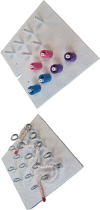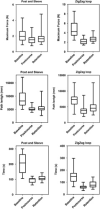Objective measurement of retention of laparoscopic skills: a prospective cohort study
- PMID: 37010141
- PMCID: PMC10389389
- DOI: 10.1097/JS9.0000000000000272
Objective measurement of retention of laparoscopic skills: a prospective cohort study
Abstract
Introduction: There has been an overall growth of 462% in laparoscopic procedures performed by surgical residents between 2000 and 2018. Therefore, training courses in laparoscopic surgery are advocated in many postgraduate programs. While the immediate effect is determined in some cases, the retention of acquired skills is rarely investigated. The objective of this study was to objectively measure the retention of laparoscopic technical skills to offer a more personalized training program.
Methods: First year general surgery residents performed two fundamental laparoscopic skills tasks (Post and Sleeve and the ZigZag loop) on the Lapron box trainer. Assessment was performed before, directly after, and 4 months after completing the basic laparoscopy course. Force, motion, and time were the measured variables.
Results: A total of 29 participants were included from 12 Dutch training hospitals and 174 trials were analyzed. The 4 months assessment of the Post and Sleeve showed a significant improvement in force ( P= 0.004), motion ( P ≤0.001), and time ( P ≤0.001) compared to the baseline assessment. The same was true for the ZigZag loop: force ( P ≤0.001), motion ( P= 0.005), and time ( P ≤0.001).Compared to the 4 months assessment, skill deterioration was present for the Post and Sleeve in the mean force ( P= 0.046), max impulse ( P= 0.12), and time ( P= 0.002). For the ZigZag loop, skill decay was observed for force ( P= 0.021), motion ( P= 0.015), and time ( P ≤0.001) parameters.
Conclusion: Acquired laparoscopic technical skills decreased 4 months after the basic laparoscopy course. Compared to baseline performance, participants showed significant improvement, however deterioration was observed compared to postcourse measurements. To preserve acquired laparoscopic skills, it is recommended to incorporate maintenance training, preferably with objective parameters, in training curricula.
Copyright © 2023 the Author(s). Published by Wolters Kluwer Health, Inc.
Conflict of interest statement
All authors declare that they do not have any conflicts of interest or financial ties to disclose.
Sponsorships or competing interests that may be relevant to content are disclosed at the end of this article.
Figures
Comment in
-
A commentary on 'Objective measurement of retention of laparoscopic skills: a prospective cohort study'.Int J Surg. 2023 Aug 1;109(8):2533-2534. doi: 10.1097/JS9.0000000000000493. Int J Surg. 2023. PMID: 37222688 Free PMC article. No abstract available.
References
-
- Rassweiler J, Rassweiler MC, Kenngott H, et al. . The past, present and future of minimally invasive therapy in urology: a review and speculative outlook. Minim Invasive Ther Allied Technol 2013;22:200–209. - PubMed
-
- Driessen SRC, Baden NLM, van Zwet EW, et al. . Trends in the implementation of advanced minimally invasive gynecologic surgical procedures in the Netherlands. J Minim Invasive Gynecol 2015;22:642–647. - PubMed
-
- Zhang X, Wu Q, Hu T, et al. . Laparoscopic versus conventional open surgery in intersphincteric resection for low rectal cancer: a systematic review and meta-analysis. J Laparoendosc Adv Surg Tech A 2018;28:189–200. - PubMed
MeSH terms
LinkOut - more resources
Full Text Sources




